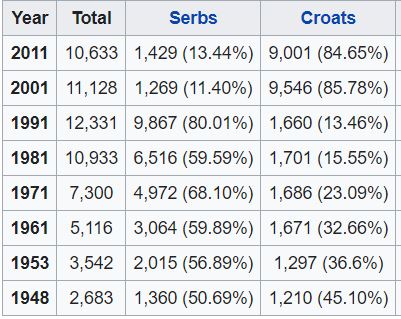Operation Storm: Foreign Reflections on a Visit to Oluja 2020 in Knin
September 12, 2020 - It is over a month since Croatia celebrated the 25th anniversary of Operation Storm. Some reflections from a foreigner who attended Oluja 2020 in Knin.
(Author's note - I had intended to write this article some time ago, much sooner after the event, but time was against me)
Although I have been fortunate to have travelled the world, visiting almost 100 countries and living in 10, I have yet to meet a region quite like the one here. Every country has its different viewpoints from those who live and visit it, but this region seems to excel in that regard. Perspective is usually heavily influenced by personal experience, and never was this more true than in this most divided of regions. Attitudes to the Homeland War differ vastly between Croats who were in Istria or Vukovar, for example. Even more so between Sarajevo and Belgrade.
Although I have lived in Croatia now full-time for 17 years, it took me a number of years to realise that my perspective was out of sync with almost everyone else. Arriving on Hvar in August 2002, I found a touristic paradise, which would soon become my new home as I bought a house in Jelsa a month later. Although it was just seven years since the war had ended, there was little trace of that on Hvar, where the tourism industry was recovering nicely, and the lack of physical scars of war meant that the recent past did not really touch me. I lived for years in that naive bubble, and the recent past only entered it in the first week of August each year, when Croatia celebrated its holiday, Victory and Homeland Thanksgiving Day and the Day of Croatian Defenders.
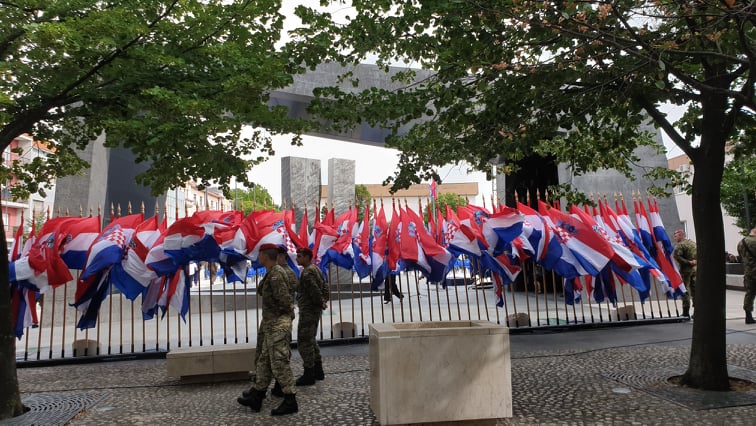
While I now completely understand the raw emotions of the occasion, for years, this day in Jelsa left me cold and I avoided the town on that day. One of the things I often get tarnished with as a Brit here is the actions and meddling of the British Government both here and elsewhere. As a former aid worker, I spent most of my time in Africa when not working apologising for actions done in my name as a British citizen. Extreme displays of nationalism - whatever the country - are things I tend to run from, although the more I understand Croatia after that initial bubble, the more I understand the nationalist pride of this very young nation which successfully fought against all the odds for its freedom.
August 5 is the date that this is celebrated, and the focal point each year is in Knin, the liberation of which in 1995 was part of the biggest land battle in Europe since World War II. Operation Storm was a complete triumph for Croatia, liberated almost 20% of the county in days, averted another Srebrenica in Bihac, and effectively brought the war to an end after four years of bloody fighting and occupation. What is not to celebrate?
Due to my perspective and lack of deeper understanding of the situations, I consciously avoided all mention of both Vukovar and August 5 in Knin for many years. With so many perspectives and experiences that were much more involved and painful than my own, there would have been little of value to add, as well as the inevitable offence taken by the words of a Brit who either did not understand or had an alleged agenda.
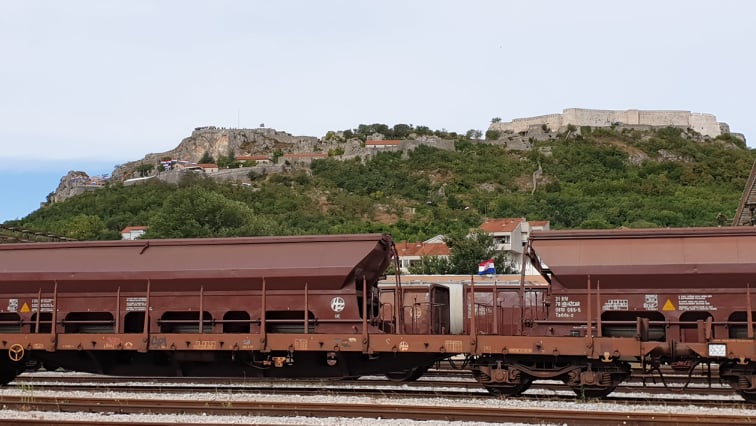
But then last November, just before the annual Vukovar Remembrance Parade on November 18, I decided to visit. I had read a lot about Vukovar and what happened in those tragic months in 1991, but there was nothing online in English about the experience of attending the annual remembrance day, which is one of the most important dates in the Croatian calendar. And, not for the first time in Croatia, what I found on the ground in Vukovar was very different to the perceptions that I had been given from second-hand sources. You can read my experience in Vukovar Remembrance Day Through the Eyes of a Foreign Resident.
And, having been to Vukovar, it was time to attend the annual event in Knin at Oluja 2020. As I left my house in Varazdin at 4am to pick up my press accreditation by 9am, I was sure that this was going to be a difficult day, and not one I was going to enjoy.
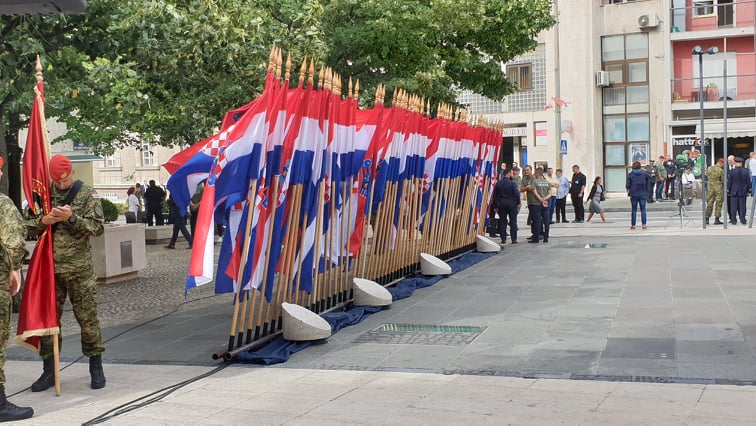
But, just like my day in Vukovar, what I found on the ground was very different to my expectations, one of the most dignified and measured victory celebrations I have seen. And one with some very large seeds of hope in the future.
(Population of Knin, source Wikipedia)
There are two very different perspectives on Operation Storm, which is seen as a great liberation by Croatia, while Serbs see it as both a disaster and massive ethnic cleansing of a region which had been majority Serb for generations. That is not a debate for me to get into, but what is undisputed is that the population shifts from 1991 to 1995 were significant. Firstly, many Croats fled from the newly-established Krajina Republic, which brought the Serb population up to 88%, before Oluja completely reversed those numbers, as Serb civilians took the path of their retreating army towards Belgrade. What is beyond argument was that Operation Storm was a stunning military tactical and operational success, which completely turned the tide of the war, while liberating occupied Croatia.
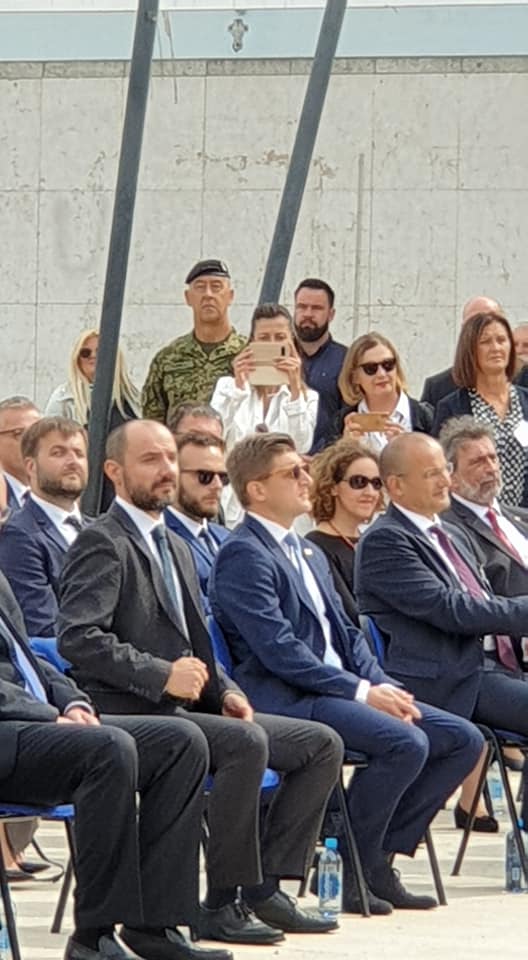
(Serb MP Boris Milosevic, left)
Oluja 2020 was the 25th anniversary of Operation Storm. It is a national event each year, broadcast live on national television and attended by all the senior politicians and other dignitaries. Among them was General Ante Gotovina, who was instrumental in commanding the success of the operation. This year's event was also historic for the appearance of a Serb politician for the first time, with Croatian government representative Boris Milosevic from the Independent Democratic Serb Party (SDSS) took his place in the front row. As a further symbol of some seeds of reconciliation, the government announced that Milosevic, the Croatian Government's Vice-President for Social Affairs and Human Rights, would accompany Veterans Minister Tomo Medved to lay a wreath in the village of Grubori, north of Knin, where several elderly Serbs were killed less than 3 weeks after Operation Storm.
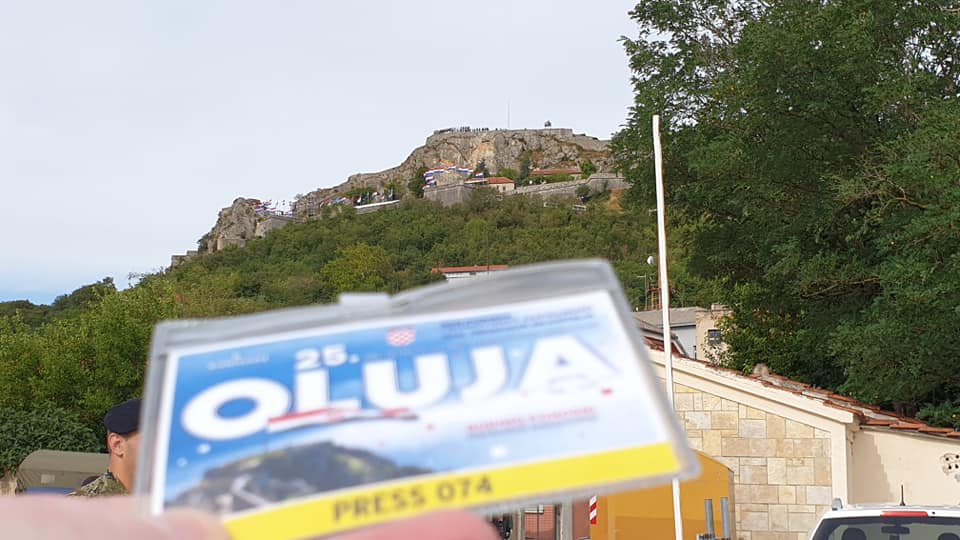
I wasn't sure what to expect as I picked up my press pass, but I was surprised to see that I was the only foreign journalist covering the event. While the main event was in Knin's central square and timed to include the 09:43 arrival of Croatian troops in the city, all eyes were on its imposing fortress, where the flag of liberation was raised at exactly 09:46. This was carried live on a giant screen on the main square and was clearly a moment of intense pride and emotion for every Croat watching.
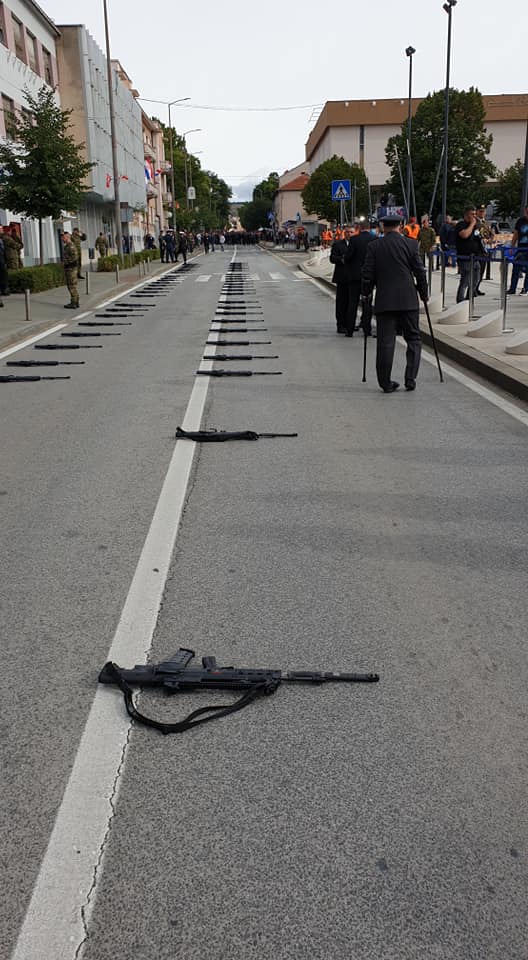
I was surprised at how empty the main square was. Social distancing - of people and weaponry - had come to Oluja 2020 apparently.
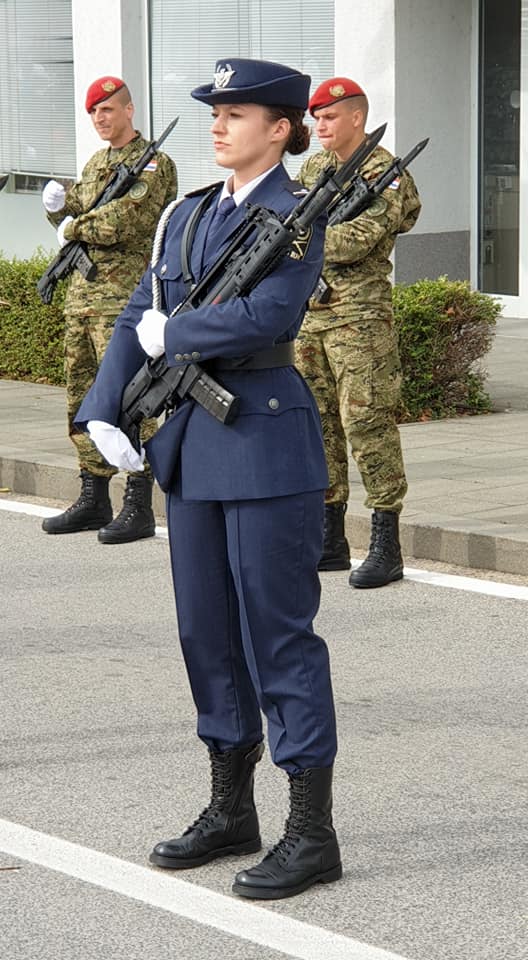
The weapons were soon taken up by the soldiers to whom they were allocated.
And a bearing of arms followed.
(The raising of the flag at 09:46 - click if video above unavailable)
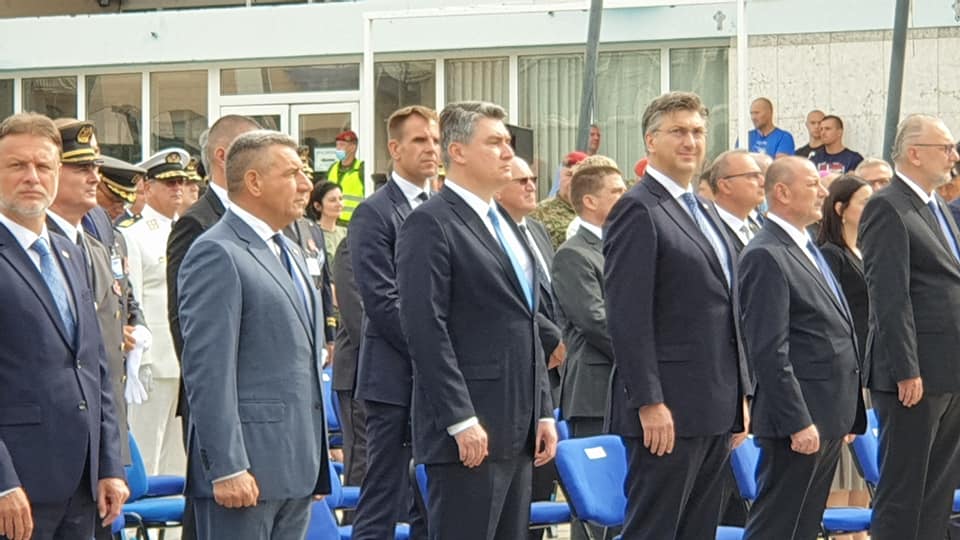
Centre stage in the front row was Prime Minister Andrej Plenkovic, President Zoran Milanovic and General Ante Gotovina, all of whom gave speeches.
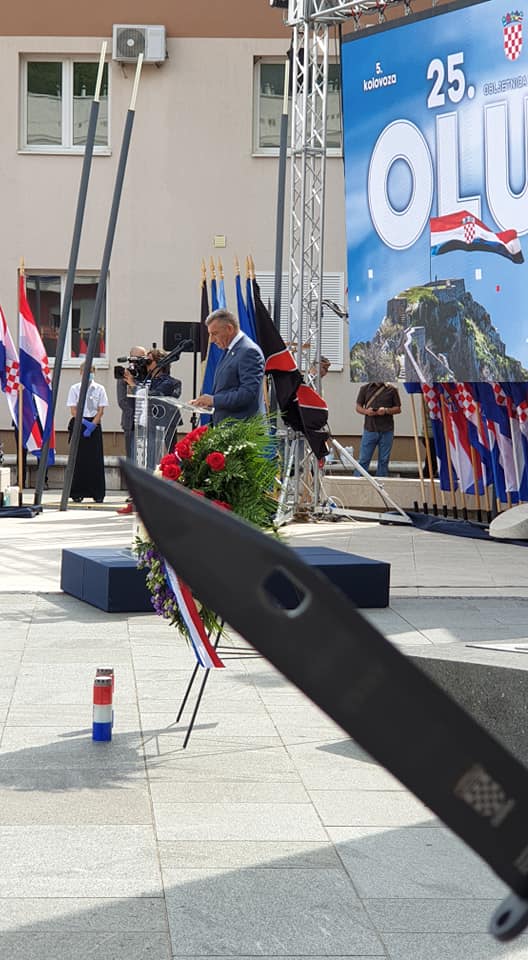
You can learn more about Gotovina's speech in Gotovina: We Are Stronger and Better people, Ready to Work for a Better Tomorrow.
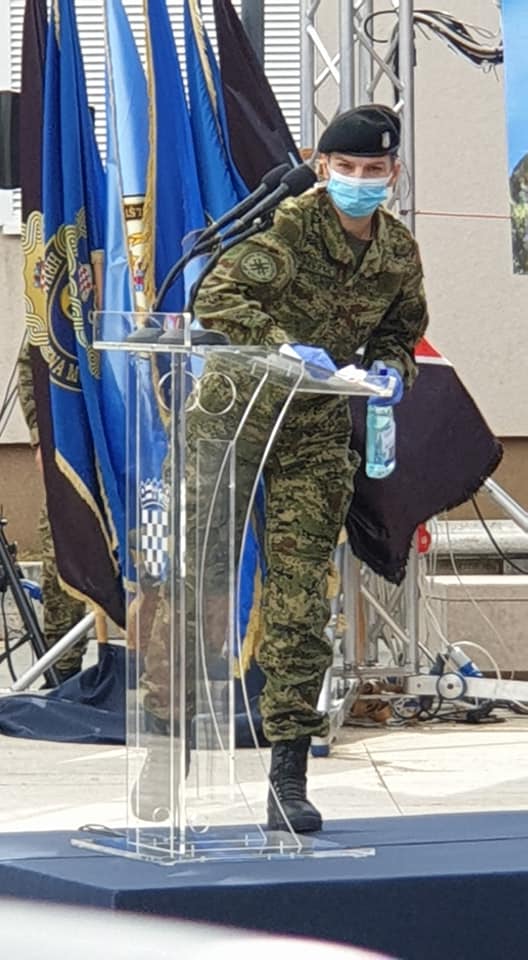
Much was made of social distancing, with the lecturn disinfected between after every speech, although this initiative was somewhat undone by the President, who shook the hands of both the General and the Prime Minister to congratulate them on their speeches.
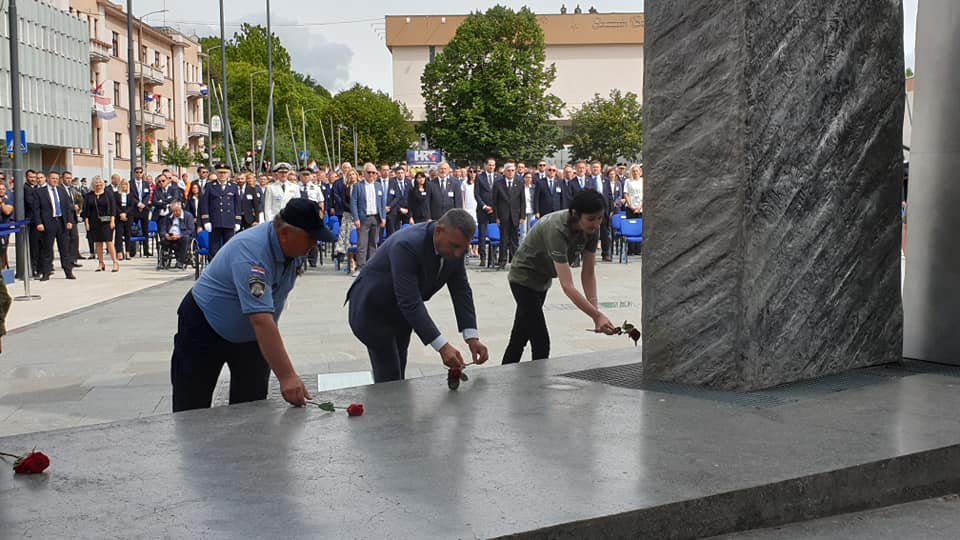
It must have been an intense day for General Gotovina, who hid his emotions well, but clearly felt the name of each fallen soldier as their names were read out.
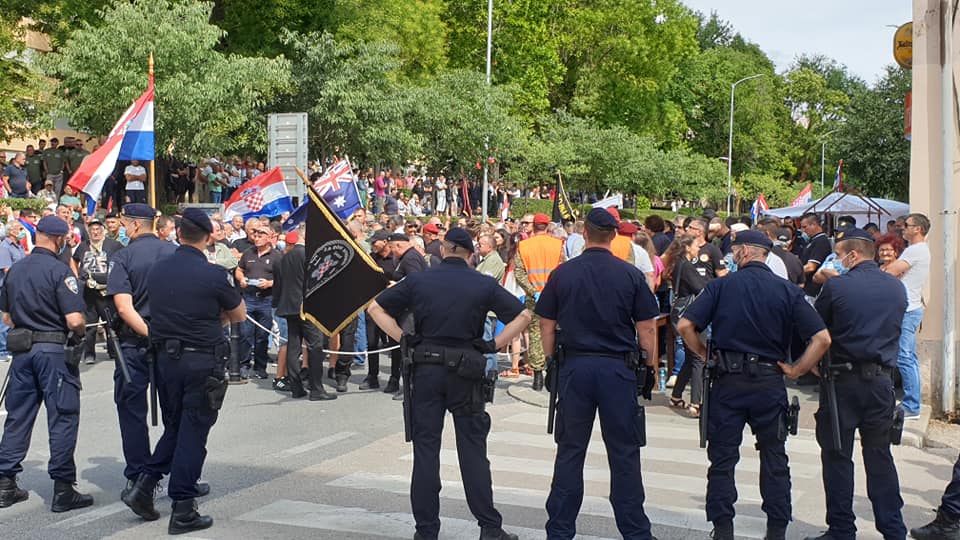
The whole event was extremely dignified, conciliatory, full of remembrance and pride at the considerable achievement of liberation a quarter of a century ago - a perfect tone. Impressive stuff.
After two Croatian MiG fighters flew overhead (a little too quickly for this aspiring photographer to document), it was time to take a walk around town, and I soon realised why things were so quiet on the main square.
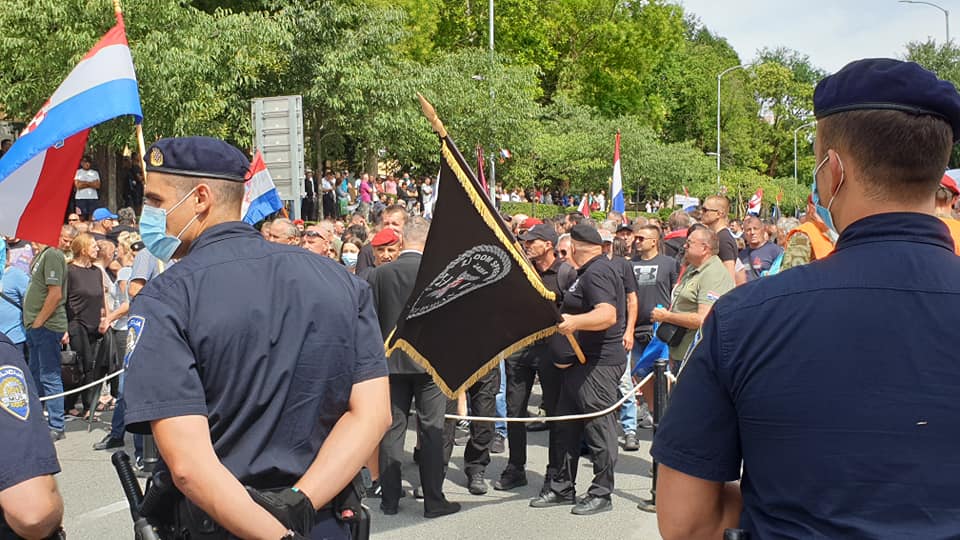
A line of masked policemen were preventing the marchers from proceeding, the first time this has happened apparently. It was still early in the day, but the atmosphere was good-humored and celebratory.
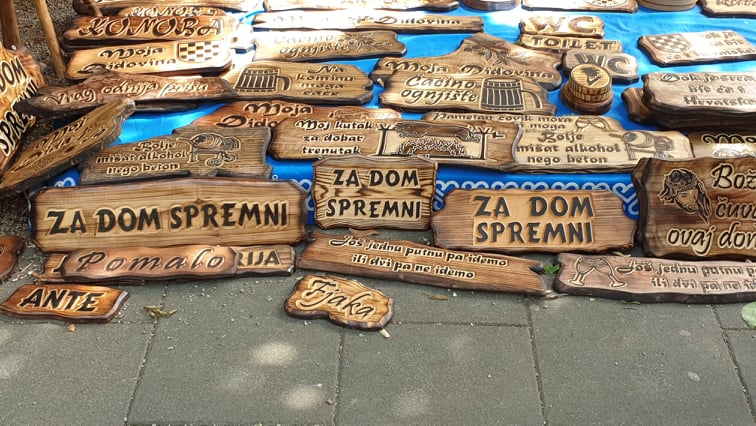
There were, of course, some souvenirs on offer that one would perhaps not find at Advent in Zagreb, but the atmosphere was a lot less intimidating than I had been expecting.
As the dignitaries headed on to Mass, I decided to go in another direction - in search of this Serb village of Grubori, scene of that 1995 massacre and soon to be the symbol of another seed of reconciliation with the visit of Medved and Milosevic (this event took place on August 26, with President Milanovic and SDSS leader Milorad Pupovac also in attendance).
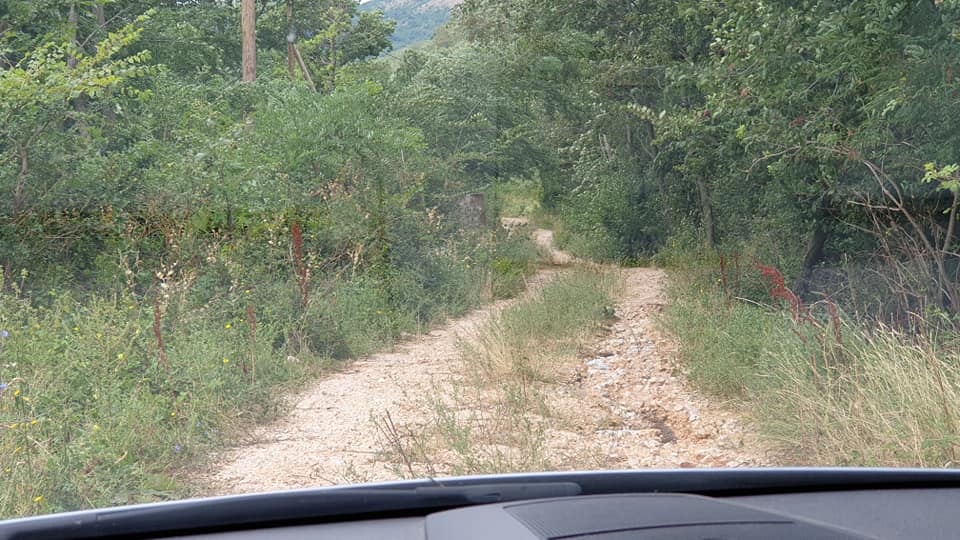
That Grubori visit took place three weeks after Oluja 2020 - I was trying to find it on my own on the day. The first surprise was that Google Maps had never heard of it. Indeed, it didn't seem to exist at all online, apart from those terrible events on August 1995. A Croatian colleague told me to head to a village called Plavno, 30km north of Knin, and then to ask.
I have been to some desolated spots in the Balkans in my time, but this one was right up among them. Finally arriving at Plavno, a seemingly almost deserted place and former heartland of Serb population in the Knin region, a local man in his string vest put his head out of the window at the sound of a rare car.
Grubori? There is no sign. Over the bridge and then the rough road to the right.
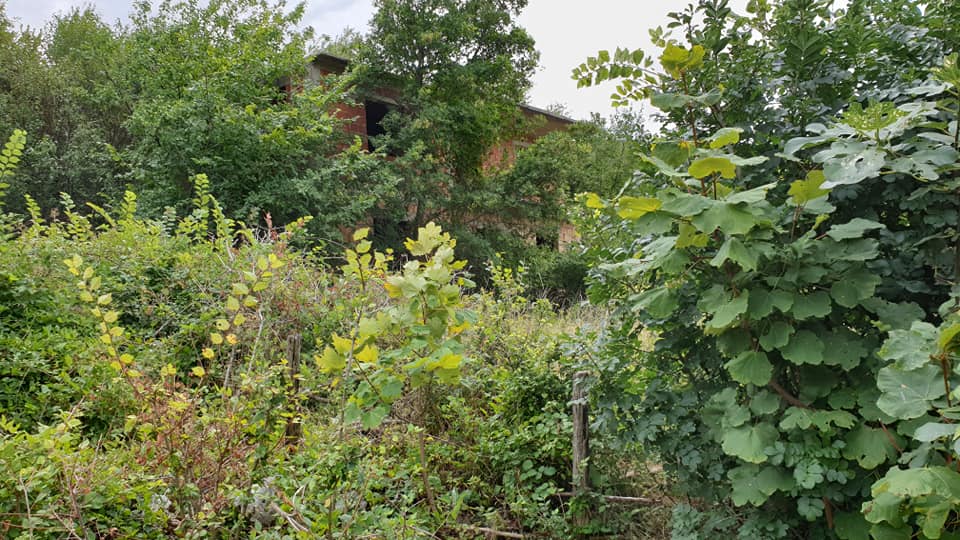
I think I got to the right place, but if not, it was one of several very similar. Abandoned, overgrown, forgotten. Like so many villages on both sides in this region.
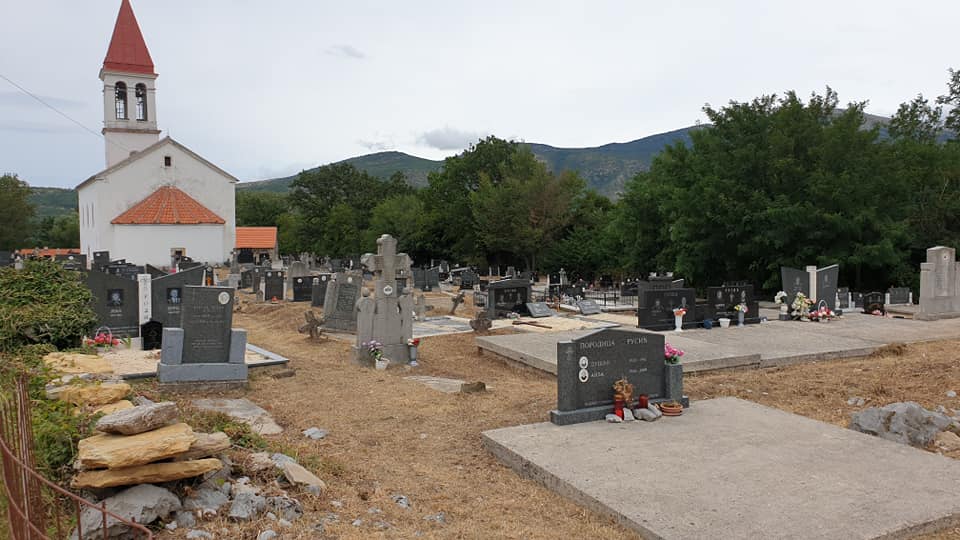
Going back to Plavno, I was surprised to see a well-tended Serb graveyard, the graves maintained and many with fresh flowers. There seemed to be almost nobody in the area at all.
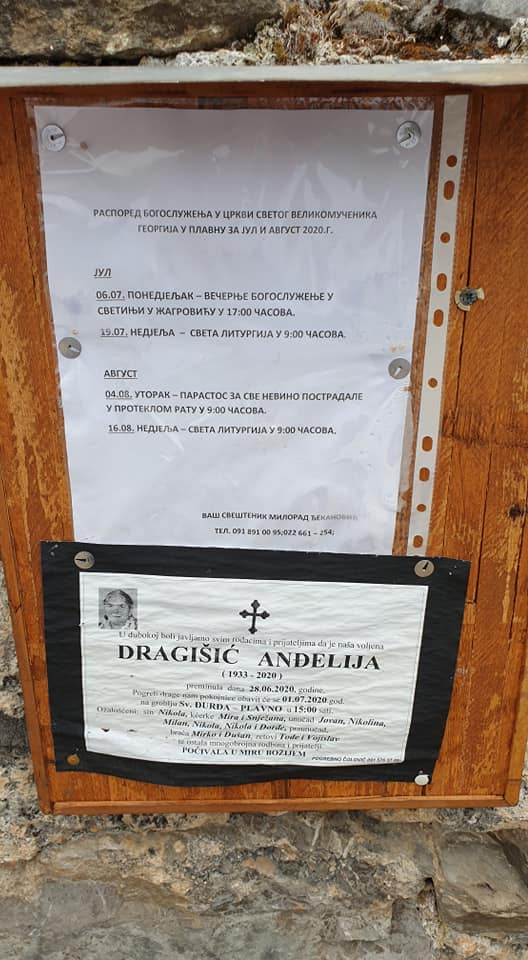
Appearances were misleading, however, and it seems that the church has regular community gatherings.
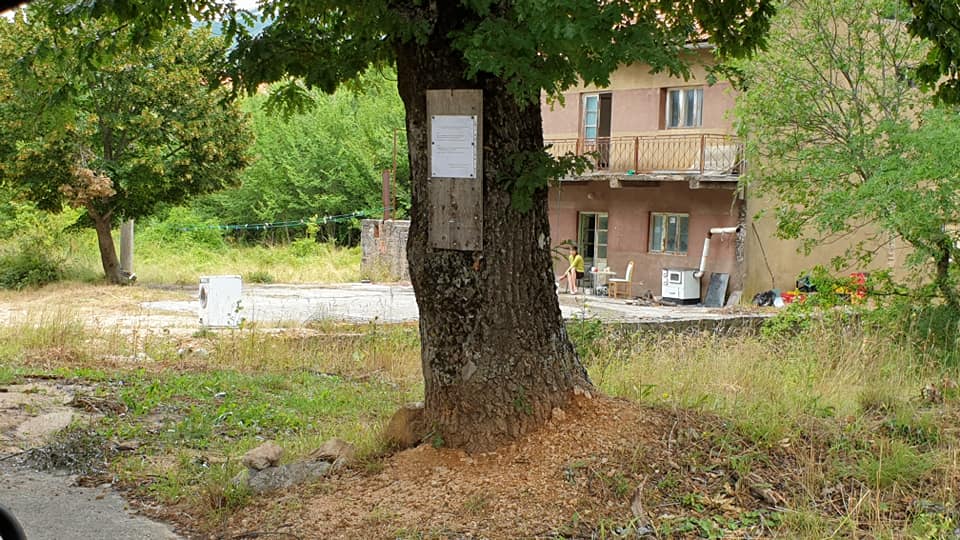
Indeed, the only other person I saw in the entire area was a Serb woman sitting in her yard cleaning vegetables, a rusting washing machine for company. The other side of 25 years of Oluja.
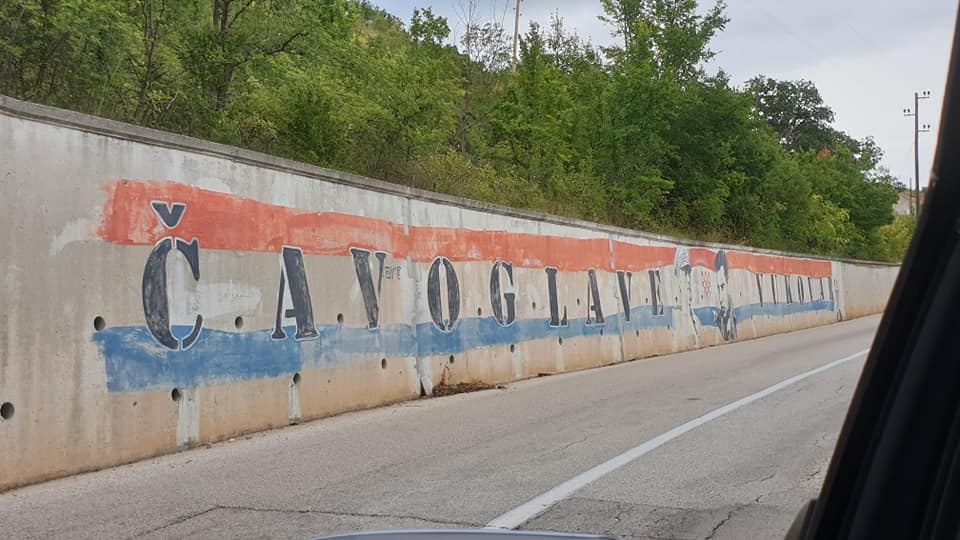
From Grubori to Cavoglave, a focal point of the Oluja celebrations each year, as well as a reminder of the fierce fighting and suffering that took place here.
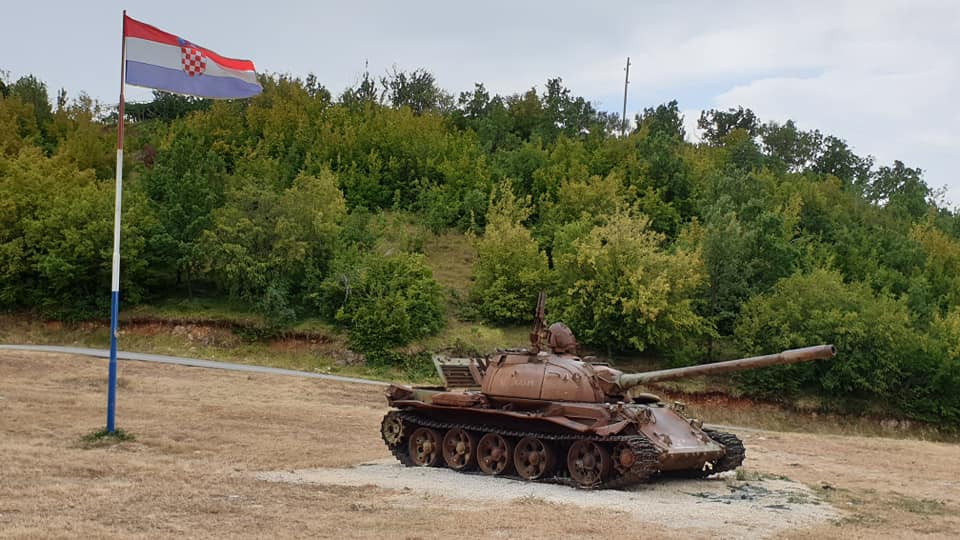
Croatia might have won its independence, but the cost was high, and the pain and memories remain.
Did my perspective change somewhat with a visit to Oluja 2020? Yes, for sure. The balance of celebration, remembrance and looking forward was a difficult one to get right, but the overall impression was a superbly organised event which struck completely the right balance. These are small beginnings, but encouraging ones.
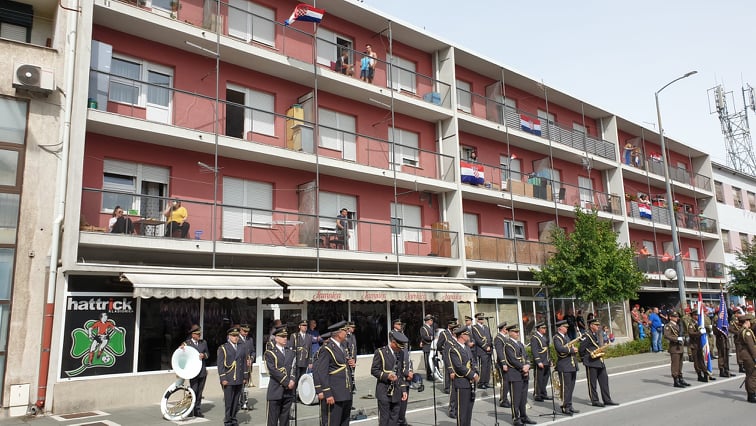
While moves towards reconciliation are welcome, there are more pressing problems to deal with. This building overlooking the main square was a symbol of another more immediate problem once the celebrations of independence subside. With restricted access to the main square event, one might have assumed that the balconies in surrounding buildings offering a grandstand view would be popular. But I counted just 10 of the 36 terraces in use, and the majority of the other apartments shuttered up. My initial thought was that this was perhaps due to the Serb exodus 25 years ago, but I was told locally that the population of the Knin workforce has declined 20% in the last 12 months alone. The owners are more likely to be found in Dublin, Munich or Stockholm.
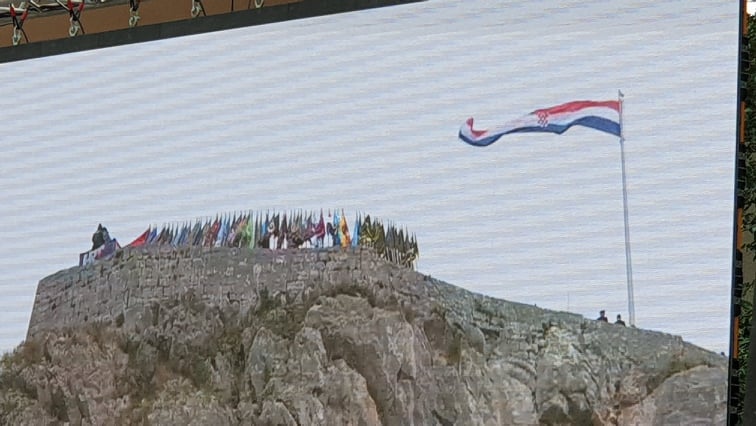
It was quite a day. I learned a lot. I arrived in the morning with a sense of trepidation, and I left in the afternoon with a feeling of hope. There is a long way to go, but I had a feeling that I had witnessed an important first step on a journey.
Bravo, Hrvatska, on an outstanding example of how to remember the past, celebrate freedom, and look to the future.
Pupovac: Anyone Who Thinks State Can Be Excuse for War Crimes Is Seriously Mistaken
ZAGREB, Aug 6, 2020 - Anyone who thinks that the state can be an excuse for war crimes is seriously mistaken, the leader of the Independent Democratic Serb Party (SDSS), Milorad Pupovac, said in Uzdolje, near Knin, on Thursday, in an address to a memorial ceremony for eight Serb civilians killed there in the wake of Operation Storm 25 years ago.
"Even more mistaken are those who think that peace can be built by ignoring killings like these and without showing empathy for the suffering that people endured," he added.
Pupovac said that the victims had been "perfidiously and inhumanely" killed by those who thought they were doing a big thing and those big things justified such crimes.
Pupovac said that the people attending the commemoration had gathered together to stand up to such thinking and belief, adding that they would continue to organise such memorials to condemn those crimes and encourage the authorities to identify those responsibly and bring them to justice.
"We will continue to gather together in the belief that by respecting the suffering endured by our compatriots, both Croats, and Serbs, we will create a society of peace in which we will close the chapter on the war rather than reopen it every year, a society in which people will be able to live in peace and look to the future," Pupovac said.
War crimes against Serbs seldom prosecuted
SDSS MP Anja Simpraga warned that while the war crimes committed against Croats were recognised and formally commemorated and many Serbs were prosecuted and punished for those crimes, this could not be said of the war crimes committed against Serbs and of their expulsion.
"War crimes against Serbs have been seldom punished, particularly those committed during or in the wake of Operation Storm. The places of their suffering are marked and commemorated by Serb organisations only, and they don't seem to exist for the state and the government. The same is true of the expulsion of nearly 200,000 Serbs during Operation Storm alone, not counting those expelled during Operation Flash and those expelled from many towns outside the war zones," Simpraga said.
She said that there was no public awareness among the Croats of such large-scale suffering of Serbs and no awareness of the need to express regret and empathy.
"Condemnations of war crimes are getting fewer and fewer over the years and are giving way to callousness and unchristian ridicule, hatred of the remaining Serbs, intolerance towards what makes them different from Croats, and violence," she added.
Simpraga recalled that in addition to the 200,000 Serbs who had fled from Operation Storm, nearly 2,000 had been killed during or in the wake of the Croatian military offensive, and "hundreds of villages and a thousand houses" had been devastated. She said it was high time to shed light on the war crimes, what had happened during the war, and the damage that had been done not just to Serbs but to Croatia itself.
"It is necessary to stop the hatred and violence against Serbs and start building a society of tolerance and respect for diversity. It is also necessary to stop keeping quiet about other people's suffering during the war and ridiculing it but rather show respect for the suffering of all (both Croats and Serbs). That's what honourable warriors and wise and honest politicians do and what true priests preach," Simpraga said.
Stevan, Janja and Djurdjija Beric, Milos Cosic, and Sava, Milica, Jandrija and Krstan Sare were killed in Uzdolje on 6 August 1995. No one has been brought to account for these murders.
Minister: Milosevic's Visit to Knin Turning Point in Relations Between Croats, Serbs
ZAGREB, Aug 5, 2020 - Foreign and European Affairs Minister Gordan Grlic Radman has said that the celebration of the 25th anniversary of Operation Storm in Knin was dignified and that the attendance of Deputy Prime Minister Boris Milosevic of the Independent Democratic Serb Party was a turning point in relations between Croats and Serbs.
Speaking to reporters after the ceremony, held in Knin on Wednesday on the occasion of Victory Day and Homeland Thanksgiving and War Veterans Day, Grlic Radman said that the proposal for Milosevic's presence at the Knin ceremony had come from Prime Minister Andrej Plenkovic.
Milosevic's arrival in Knin fantastic message to Serbia
"Finally, (Milosevic) is a citizen of Croatia. I think this is a turning point in our relations. Serbs are represented in the Croatian parliament, and I would describe this as a fantastic message to Serbia which should not be surprised but should welcome the fact that Serbs in Croatia regulate their issues with a democratically elected government," said Grlic Radman.
He noted that Milosevic's presence at today's ceremony in Knin could contribute to improving relations and resolving more outstanding issues as well as set an example for Serbia to turn to the future.
Grlic Radman described the Knin celebration as dignified, and addresses by top state officials as statesmanlike speeches.
Asked what kind of reception today's speeches by President Zoran Milanovic and Prime Minister Plenkovic could have in Serbia, Grlic Radman said that all the speeches at today's event were about inclusion, tolerance, future, reconciliation as well as the need to learn from the past.
Serbia owes answers about missing persons
Grlic Radman said that the war in Croatia had been imposed on the country and that in present-day Europe there was no room anymore for the policy of aggression.
"We advocate stability, peace, respect, tolerance. We expect to work on outstanding issues with Serbia," he said.
Speaking about people gone missing in the 1991-95 war who remain unaccounted for, the minister said that Serbia has a duty and obligation to give answers to their families.
"In order to achieve that, we have to talk with Serbia, it owes us answers," Grlic Radman said.
Plenkovic: Respects Are Due to Every Innocent Victim Regardless of Their Ethnicity
ZAGREB, Aug 5, 2020 - Any innocent victim of the war, be they of Croat, Serb or any other ethnicity, deserves respect, Prime Minister Andrej Plenkovic said at a ceremony marking the 25th anniversary of Operation Storm in Knin on Wednesday.
In his address, he recalled a message of reconciliation addressed by the late President Franjo Tudjman in Vukovar in June 1997 to Croatian returnees and the local Serb population: "A victor who cannot forgive sows the seeds of future rifts and evils, and the Croatian people do not want that."
Plenkovic said that this message should be borne in mind in building an inclusive, tolerant, and forward-looking Croatia. "As a country that won a war that was imposed on it, with numerous innocent civilian victims, we regret all the casualties, especially civilians, and not just Croats, but Serbs and members of all other ethnic communities as well."
Legitimate right to defence is not and cannot be excused for wrongdoing
Plenkovic expressed regret for war crimes committed by Croats, saying that "a legitimate right to defence is not and cannot be an excuse for wrongdoing." "Any such act is painful for the families of the victims and an ugly scar on the righteous face and defensive nature of the Homeland War," he added.
"We are aware that our victory in Operation Storm was traumatic for many Croatian Serbs who primarily associate it with the departure of a portion of the Serb population from their homes in what were previously occupied areas. While for the majority of Croats this was a forced exodus organised and ordered by leaders of the Serb rebellion in Knin, many Serbs still see it as an exodus before Croatian forces," the prime minister said.
Plenkovic said that 25 years on it was time to look at the complexity of what had happened then with equanimity. After Operation Storm, the Croatian state has made great efforts to ensure that Serb refugees who so wish a return to their homeland and much has been done in that regard, There are still difficulties that need to be removed so that they can feel equal and live in dignity, he added.
"We know that the whole time many Croatian Serbs in free areas of the country shared the fate of their Croatian compatriots, and many of them were in the Croatian army, of which we should be proud," Plenkovic stressed.
It is important that in Operation Storm the Croatian Serbs do not see only the exodus of their people but also the end of the war that paved the way for their return to Croatia, for everyone who so wishes.
"Finally, respects are due to every innocent victim, be they of Croat, Serb, or any other ethnicity. Respects to thousands of innocent Croat victims from Vukovar to Dubrovnik ... Respects to innocent Serb victims from Paulin Dvor to Varivode," Plenkovic said.
"We do not question the legitimacy or righteousness of the Homeland War nor do we downplay the victory won in Operation Storm," he added.
The humanity of a victor who regrets every lapse or war crime not prevented
Plenkovic said that this shows the magnanimity and humanity of a victor "who, despite everything, regrets every lapse or war crime that was not prevented."
"We expect the same from all sections of Croatian society, especially from representatives of the Serbs in Croatia, who should also clearly condemn all the war crimes committed against Croats," he stressed.
True reconciliation can only be built on the truth that is based on fact, on full cooperation in discovering all those still listed as missing and in seeking justice for all the victims, Plenkovic said, adding that all war crimes that do not fall under a statute of limitations will continue to be prosecuted regardless of the ethnicity of the victim or the perpetrator.
"Today, as the world copes with the biggest health threat in the last hundred years and with the gravest economic crisis since the Second World War, we must again strengthen our national unity around Croatian strategic goals. That's why we should be inspired by the courage and self-abnegation of Croatian defenders and we will be able to cope with the great challenges facing us," the prime minister said.
Plenkovic reiterated that Operation Storm was "legally legitimate, militarily inevitable and politically necessary," adding that it was imperative for the Croatian leadership at the time to make it possible for displaced Croats to return to their homes and to reconnect parts of the country that had been severed until then.
With more than 20,000 dead and 15% of the housing stock damaged, Croatia suffered huge damage in the war which set it back 15 years in terms of development, Plenkovic said, noting that Operation Storm was also a turning point for peace and stability in southeastern Europe "which is why we can rightfully regard it as our greatest victory."
The prime minister announced that a special law on civilian casualties of the Homeland War would be adopted to resolve painful issues still burdening Croatian society.
HOS Veterans Barred Entry During Operation Storm Anniversary Ceremony
ZAGREB, Aug 5, 2020 - Several hundred HOS veterans, including those wearing T-shirts with the inscription "For the Homeland Ready" and those shouting this Ustasha salute, were barred entry into the main square in Knin during a ceremony marking the 25th anniversary of Operation Storm on Wednesday but were allowed in afterward.
A spokeswoman for the Sibenik-Knin County Police Marica Kosor told Hina that several hundred veterans of the Croatian Defence Force (HOS), the wartime armed wing of the Croatian Party of Rights (HSP), and other units whom the police did not allow to enter Ante Starcevic Square, sang patriotic songs for the duration of the official programme, unhappy that they were denied entry.
Several shouts of "For the Homeland Ready", a salute used by the pro-Nazi Ustasha regime during the Second World War, could be heard, and some wore T-shirts displaying inappropriate content, the police spokeswoman said.
Asked why the veterans were not allowed into the square to watch the programme, Kosor said that they did not have accreditation and the venue could take only about 600 guests because of the epidemiological measures in place to contain the spread of the coronavirus outbreak.
No incidents were reported.
Mladen Todoric, head of a veterans association from Split, told reporters earlier that they had liberated Knin in 1995 and "now there is no room for us, while there is room for Milosevic and the likes of him, apparently because of the coronavirus."
He expressed regret that "our police colleagues have been put in an awkward situation, with them on one side of the barricade and us on the other."
"We hope that this will never happen again, that veterans are barred entry into the square in Knin to pay tribute to their fallen comrades in arms and to celebrate our victory," Todoric said, adding that after the official programme "we will pay our respects and light candles."
Media said that among the HOS veterans was MP Hrvoje Zekanovic of the Croatian Sovereignists party.
Gotovina: We Are Stronger and Better people, Ready to Work for a Better Tomorrow
ZAGREB, Aug 5, 2020 - Retired lieutenant general Ante Gotovina said during the celebration of the 25th anniversary of Operation Storm in Knin on Wednesday, that by learning lessons from the past Croatians have become stronger and better people, ready to think optimistically and work today for a better tomorrow.
Speaking as a representative of veterans, he congratulated those present and underscored that Operation Storm, which took place a quarter of a century ago, had determined the country's future and marked the beginning of the end of the war and the establishment of peace.
"The courage, sacrifice, determination, and unity of our people from the start of the Homeland War and under the leadership of the first Croatian President Franjo Tudjman, wartime defence minister Gojko Susak and all the commanders of the General Staff were crucial for us to build a Croatian army is particularly unfavourable and difficult war circumstances, ready and capable of defending itself, putting an end to an imposed war and creating preconditions for lasting peace," said Gotovina.
Horrors of war in the collective conscience of the people and foundation of Croatian statehood
Gotovina added that the horrors of war and years of suffering of innocent people, the sacrifice of young soldiers, and those who lost their lives and health, were part of the collective conscience of the Croatian people, having been built into the foundations of Croatian statehood.
"It is with pride and sorrow that we remember our friends, fallen and deceased comrades in arms. I greet you, dear families, with profound respect," he said.
Gotovina said that 25 years of living in peace and security, Croatia is developing into a modern European democracy, a socially just state that cares for the smallest and most needy, a state in which all people, regardless of their differences, enjoy safety and freedom, equal rights and equal obligations.
"With the unity of all of us, from the first at the helm to the smallest, we will achieve the objectives and know how to respond to all the challenges of the time that we live in," concluded Gotovina.
Asked by reporters later to say why members of wartime HOS forces and some other war units were not allowed to attend the ceremony in the main square in Knin, Gotovina said that "discipline has to exist in everything, even in freedom."
Asked whether he was glad that Deputy Prime Minister Boris Milosevic from the ranks of the Independent Democratic Serb Party (SDSS) had attended today's event, Gotovina said that the celebration was dignified and "that is good."
Croatia Celebrates Victory Day and 25th Anniversary of Operation Storm
ZAGREB, Aug 5, 2020 - The Croatian state leadership will be in Knin on Wednesday to celebrate Victory Day, Homeland Thanksgiving Day, Croatian Veterans Day and the 25th anniversary of Operation Storm.
Operation Storm was a combined military and police operation that ended a Serb armed insurgency in August 1995 and restored Croatian sovereignty over occupied central and southern parts of the country, paving the way for the peaceful reintegration of eastern Croatia in January 1998.
The offensive was launched at 5 am on August 4 along the line running from Bosansko Grahovo to the south to Jasenovac to the east, the front line being more than 630 kilometres long. Within the next 84 hours slightly less than 10,500 square kilometres of territory, almost a fifth of the country, was liberated.
The operation culminated on August 5, when the Croatian Army's 4th and 7th Guard Brigades liberated Knin, the heart of the Serb rebellion, displaying a 20-metre-long Croatian flag on the town's fortress at noon.
About 200,000 Croatian soldiers and police took part in the biggest operation of the Homeland War. According to the Homeland War Memorial and Documentation Centre, 196 Croatian personnel were killed, at least 1,100 were wounded and 15 went missing, while losses among Serb forces were several times higher.
The Serb National Council has said that during and after Operation Storm 200,000 Serbs were displaced from Croatia and nearly 2,000 were killed. The Croatian Helsinki Committee for Human Rights has reported 677 civilian casualties and 20,000 damaged properties in the area liberated by Operation Storm, while the Documenta NGO put the number of civilian casualties below 677.
Operation Storm marked the end of the war in Croatia, created conditions for the peaceful reintegration of the eastern Danube River region, helped break the siege of the northwestern Bosnian town of Bihac, and enabled the return of refugees and displaced persons.
President Decorates HV Generals, HVO Guards Brigades
ZAGREB, Aug 5, 2020 - The President of Croatia and Commander in Chief of the Croatian Armed Forces, Zoran Milanovic, at a ceremony in Knin on Tuesday evening, presented medals to Croatian Army (HV) generals and Bosnian Croat HVO guards brigades for their contribution to the liberation of Croatia 25 years ago.
"There is time for everything. Twenty-five years after a great victory in the Homeland War, it is time for us to get together and repeat that a small group of good people did a great thing for a large group of people, putting themselves, their lives and safety, in jeopardy," Milanovic said in an address to a reception held on the Knin Fortress on the occasion of Victory Day, Homeland Thanksgiving Day, Croatian Veterans Day and the 25th anniversary of Operation Storm.
He said that the war that was imposed on Croatia was just and inevitable, and that "never, despite certain lapses, did we fall into an abyss of moral catastrophe." He also said that there had been attempts to portray the Croatian war of liberation as a criminal enterprise, but "luckily they failed".
Milanovic said he was honoured to decorate the Bosnian Croat units. "It is our debt of honour," he said.
"Today, 25 years on, we are here. We are looking back, but most of all we are looking forward, aware of all the challenges, traps, and unknowns. What I can say with a deep conviction is that the wars are over and that Croatia won them. Long live Croatia!" the President said.
Gotovina: It's never too late to do good
Retired General Ante Gotovina said that a lot of time had passed since the war, "but it is never too late to do good, to do right."
"Dear friends, with your courage and your selfless dedication to the country at that fateful time for our people, through the unity of us all, we built a Croatian army capable of defending itself, ending an imposed war and creating conditions for lasting peace," Gotovina said.
VIDEO: Rijeka Fans Light Up Krk Bridge with 222 Flares for Operation Storm
August 5, 2020 - 222 defenders were killed in Primorje-Gorski Kotar County during the Croatian War of Independence. 222 torches are traditionally burned in their honor on Krk Bridge to commemorate Operation Storm.
Operation Storm, a strategic victory in which the Croatian Army liberated Croatia, began on this day in 1995. It is considered the most important military offensive of the Croatian War of Independence.
Index.hr reports that during the Croatian War of Independence, from 1991 to 1995, 222 defenders were killed in Primorje-Gorski Kotar County, and 222 torches are burned in their honor on the Krk Bridge. The traditional torchlight procession has been organized since 2017 by the NK Rijeka fan group 'Armada', the 'Vavik Vjerna Kirija' fan association from Crikvenica and members of the 'Blue and White Island' fan association from the island of Krk.
Take a look at the scenes from the Krk Bridge below.
"There is no surrender! Honoring the dead does not allow a delay, not for anything, let alone for the rain!" pointed out the Armada fan group, answering the question if the adverse weather on Tuesday would disrupt the torchlight procession on the Krk Bridge, by which fans pay tribute to the fallen veterans from Primorje-Gorski Kotar County that gave their lives for an independent Croatia.
"On this day in 1995, the victorious Storm started. How would it be if the operation was postponed because very high temperatures were announced, if they delayed the action for a more pleasant situation? We cannot retreat, there will be 222 torches for the heroes from Primorje-Gorski Kotar County whose lives were lost for our freedom in the Homeland War.
Several inquiries arrived in the last few hours about whether the traditional Armada torchlight procession would take place. The reason for concern can be seen with the naked eye, just by looking out the window and the announcement of more torrential rain over Rijeka, including in the area of Kraljevica during the torchlight procession. Delaying this is out of the question and there is no surrender. Get dressed and go to Kraljevica, Oštar, Voz, Črinjševa," said the members of the Armada before the torchlight procession.
To read more about sport in Croatia, follow TCN's dedicated page.
Milanovic: It Would Be Good Not to Embarrass Ourselves as a Country
ZAGREB, Aug 4, 2020 - It would be good not to embarrass ourselves as a country, President Zoran Milanovic said on Tuesday referring to announcements by some individuals that they would attend the celebration of the 25th anniversary of the military and police operation Storm in Knin wearing T-shirts with the emblem "For the Homeland Ready".
"That isn't the same. In Okucani, it was a matter of protocol. They appeared before the prime minister and me. This is a different situation. It would be good not to embarrass ourselves as a country, but if they wish to shout, let them but they should not wear those T-shirts, that just causes us harm," Milanovic said after attending the 30th anniversary of the establishment of the first Croatian police unit at the Croatian Police Academy in Zagreb.
Asked whether he would react as he did in Okucane when he left the commemoration because of the "For the Homeland Ready" HOS emblem if the same emblem was included in the protocol of the Knin commemoration, Milanovic said he would because he acted in line with his principles which the people had recognised.
I will not allow Croatia to be ridiculed, PM will make sure everything goes well
"I will certainly not allow the Croatian state and symbols to be ridiculed. I am certain that the prime minister will make an effort for that to be clean," said Milanovic.
With reference to Deputy Prime Minister Boris Milosevic of the Independent Democratic Serb Party (SDSS) attending the Storm celebration, Milanovic said that that was good but that he had not expected it.
"There will be a celebration in Knin tomorrow and not a commemoration. I do not expect everyone in Croatia to celebrate everything in the same way. That is why I am glad, if this is sincere, and I believe it is, for Milosevic to come," stressed Milanovic.
At not one moment, with possible faults during the war and in its aftermath, did Croatia fall into a moral disaster, he added, saying that there were mistakes and faults which had been paid for both in courts and materially.
"A stain remains but the victory is big, clean and unquestionable. If some are unhappy about it, let it be. That is why I am glad that Boris Milosevic is coming, he was an official in my government, too," Milanovic underlined.
No harsh words between prime minister and myself
Asked whether he had been in contact with Prime Minister Andrej Plenkovic since last week following mutual criticism, Milanovic said that there were no harsh words there.
"The only thing he said was that I was bored, but that wasn't directed at me personally but to the position I hold. I didn't take that personally," he added.
As far as the powers of the National Civil Protection Authority are concerned, which he considers to be unconstitutional, Milanovic said that he had not launched proceedings to test its constitutionality because thirty other people had already done so and that it would not be any more relevant if he did so too.
"The president does not have any special status or special active legitimacy before the Constitutional Court and that is not the job of the president. It is up to me to say, and I have done so clearly from the very beginning - it is unconstitutional," he said. He reiterated that there is a way to regulate the matter, with the Sabor granting certain powers to the authority for a limited period.
EU funds: The prime minister has to take and use that money without delay
With regard to EU funding allocated to Croatia, Milanovic said that this was an enormous amount and that it was up to the prime minister to make sure that money was taken and used without any delay.


